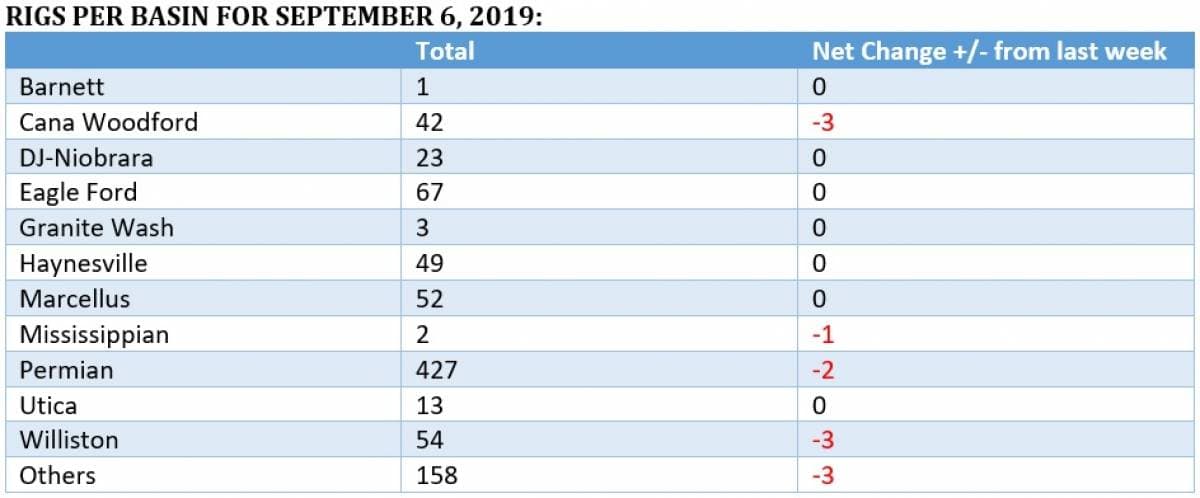Investor Alert: Gain Access To The Ultimate Network Of Energy Experts
From geopolitical breakthroughs to trading tips and advice - this is the place for energy professionals

(Click to enlarge)

(Click to enlarge)

(Click to enlarge)

(Click to enlarge)
- Natural gas spot prices in West Texas at the Waha hub are on the rise in anticipation of the startup of the 2 Bcf/d Gulf Coast Express Pipeline, which will carry Permian gas to the Gulf Coast.
- Waha hub prices rose as high as $1.55/MMBtu in mid-August, after trading in negative territory at times over the past year. In the first eight months of 2019, Waha prices averaged just $0.65/MMBtu, according to the EIA.
- Waha prices were only $0.59/MMBtu below Henry Hub prices last week.
Market Movers
- Freeport LNG says it has raised more than $1 billion to add a fourth production unit to its LNG export facility along the Texas Gulf Coast.
- EQT (NYSE: EQT) is set to announce layoffs that could affect 200 people at the company, according to Pittsburgh Business Times. The shale gas giant is in the midst of a restructuring after a change of management.
- Antero Resources (NYSE: AR) was downgraded by Goldman Sachs to Neutral from Buy due to lower natural gas prices.
Tuesday, September 10th, 2019
Traders grew more confident about the trajectory of the OPEC+ cuts after the shakeup in Saudi Arabia. Meanwhile, some recent economic data soothed some of the more acute concerns about a slowdown, although it should be noted that economic cracks have not gone away. Though Trump’s surprise firing of Bolton on Tuesday morning hurt bullish sentiment, driving fears that Washington may ease off on its hard stance against Iran, oil remained relatively unfazed.
Saudi oil minister replaced. Saudi Arabia replaced its energy minister with King Salman’s son, Prince Abdulaziz bin Salman, now at the top of the ministry. On its face, the move does not immediately change oil policy for the kingdom. But it is the first time that a royal family member will run the powerful ministry, bringing more control to crown prince Mohammed bin Salman. The immediate priority is the IPO of Saudi Aramco, which underscores the Kingdom’s need for higher oil prices. Related: The Biggest Tech Play Of The Year Is Flying Under Wall Street’s Radar
Institutional investors divest from fossil fuels. The number of institutional investors that have cut fossil fuels from their portfolios has sharply increased, rising from 180 in 2014 to 1,100 today, according to the FT. Pressure on investors to cut ties with oil and gas due to the industry’s role in fueling climate change is having a notable effect, the FT says. For instance, Royal Dutch Shell (NYSE: RDS.A) disclosed in its annual report that climate divestment campaigns are a “material risk” to its business.
Natural gas to be killed by renewables. A new study finds that roughly 90 percent of the gas-fired power plants in the U.S. will be more expensive than renewables by 2035. The study from Rocky Mountain Institute concluded that gas plants now on the drawing board will become uneconomic before they are even paid off. “Our story for gas plants is, if you build it, they won’t run - they won’t run at their expected capacity factors,” Mark Dyson, a co-author of the report, told Bloomberg. “And that filters down to pipelines, too.”
Activist investors seek to block Callon Petroleum’s acquisition. A group of investors that own roughly 9.5 percent of Callon Petroleum (NYSE: CPE) wrote a letter stating that they would try to block the company’s acquisition of Carrizo Oil & Gas (NASDAQ: CRZO), calling the deal “value-destructive.”
Indian and Chinese car markets post more bad news. Car sales in India declined by the most on record in August, plunging by 41 percent year-on-year. Slowing growth is negatively impacting auto sales. In China, car sales fell in August once again, the 14th time in the last 15 months.
ADVERTISEMENT
Gas industry alarmed by bans. Berkeley, California became the first city to ban natural gas systems in new buildings in July, but many more cities are looking at adopting similar provisions. The trend is spreading alarm in the natural gas industry and among the oil majors, who have made long-term bets on rising gas demand. “We are trying to get ahead of it,” Stuart Saulters, the Director of Government Affairs of the American Public Gas Association, told Reuters. “We think there is a chance this can domino.”
Moody’s: Railroads could see $5 billion loss from coal’s decline. According to Moody’s, the U.S. railroad industry could see $5 billion in revenue disappear over the next decade due to the decline of coal use. The credit ratings agency sees coal demand falling by half by 2030.
Shale buzzwords shift from “ramp up” to “free cash flow.” The Wall Street Journal analyzed transcripts of earnings calls from more than 40 U.S. shale companies, and the rhetoric used focused on “capital discipline,” “free cash flow” and “live within cash flow,” whereas executives used to speak of a “ramp up” in activity or “production growth.”
EV demand could boost metal producers. Rising demand for metals used in the batteries in electric vehicles could increase six-fold by the mid-2020s, according to Moody’s. That only assumes that EVs capture 8 percent of road traffic, highlighting the opportunity and potential windfall that could visit major suppliers, such as the Democratic Republic of Congo. These metals include cobalt, as well as lithium, nickel and copper. Related: Scientists Find Cheaper Way Of Tapping Shale Gas Resources
Natural gas prices to stay low through 2024. U.S. natural gas prices are expected to stay low through 2024, according to S&P Global Platts Analytics. Gas prices are projected to average just $2.66/MMBtu over the next five years, down 8 percent from last year’s forecast. “This is in response to softening global market conditions, increased associated gas production and muted domestic demand-side gains,” the report read.
Mexico unveils budget that rests on production growth. Mexico’s budget assumes oil production growth of 17 percent this year, an unrealistic prospect after roughly 15 years of declines.
Repsol in talks to buy Gulf of Mexico assets from ExxonMobil. Spanish oil company Repsol (BME: REP) is considering purchasing deep water assets from ExxonMobil (NYSE: XOM) in the Gulf of Mexico for $1 billion. Talks are in an advanced stage but have not been finalized.
Oil prices could rise on shale slowdown. Production problems and slowing investment in U.S. shale could result in a dramatic undershoot for U.S. oil output relative to consensus market forecasts. That, in turn, could lead to an oil price rally as the market finds itself short on oil.
By Tom Kool for Oilprice.com
More Top Reads From Oilprice.com:
- Shale Slowdown Could Trigger Major New Oil Price Rally
- OPEC Needs A Miracle To Push Prices Higher
- Oil Flashcrashes After Trump Fires Security Advisor Bolton


















